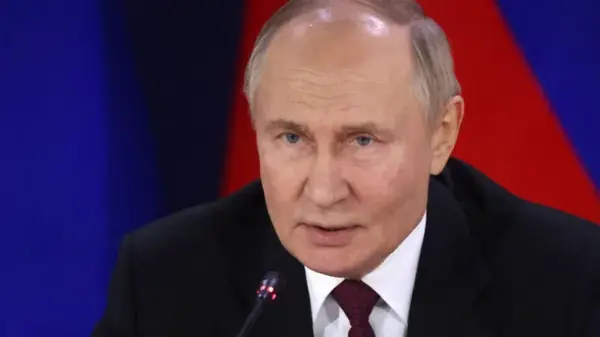President Biden’s decision to allow Ukraine to strike inside Russia with long-range missiles supplied by the US has sparked a furious response in Russia.
“Departing US president Joe Biden… has taken one of the most provocative, uncalculated decisions of his administration, which risks catastrophic consequences,” declared the website of the Russian government newspaper Rossiyskaya Gazeta on Monday morning.
Russian MP Leonid Slutsky, head of the pro-Kremlin Liberal-Democratic Party, predicted that the decision would “inevitably lead to a serious escalation, threatening serious consequences”.
Russian senator Vladimir Dzhabarov called it “an unprecedented step towards World War Three”.
Komsomolskaya Pravda, the pro-Kremlin tabloid, called it “a predictable escalation”.
What really counts, though, is what Vladimir Putin calls it and how the Kremlin leader responds.
So far he’s stayed silent.
But on Monday President Putin’s spokesman Dmitry Peskov told journalists that “If such a decision has been taken it means a whole new spiral of tension and a whole new situation with regard to US involvement in this conflict.
Mr Peskov accused the Biden administration of “adding fuel to the fire and continuing to stoke tension around this conflict.”
Western leaders would argue that it’s Russia that is ‘adding the fuel’ by recently deploying North Korean troops to the war zone to fight alongside Russian forces and by continuing to attack Ukraine.
President Putin himself may have yet to comment. But Russia’s president has said plenty before.
In recent months, the Kremlin has made its message to the West crystal clear: do not do this, do not remove restrictions on the use of your long-range weapons, do not allow Kyiv to strike deep into Russian territory with these missiles.
In September President Putin warned that if this were allowed to happen, Moscow would view it as the “direct participation” of Nato countries in the Ukraine war.
The following month, the Kremlin leader announced imminent changes to the Russian nuclear doctrine, the document setting out the preconditions under which Moscow might decide to use a nuclear weapon.
This was widely interpreted as another less-than-subtle hint to America and Europe not to allow Ukraine to strike Russian territory with long-range missiles.
Guessing Vladimir Putin’s next moves is never easy.
But he has dropped hints.
Back in June, at a meeting with the heads of international news agencies, Putin was asked: how would Russia react if Ukraine was given the opportunity to hit targets on Russian territory with weapons supplied by Europe?
In other words, arming Western adversaries to strike Western targets abroad is something Moscow has been considering.





